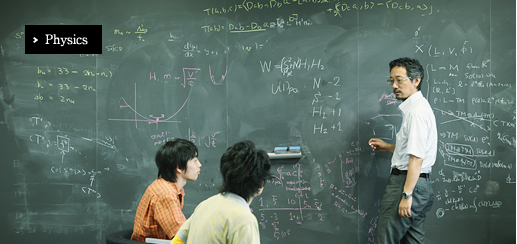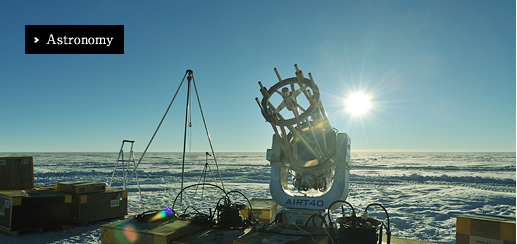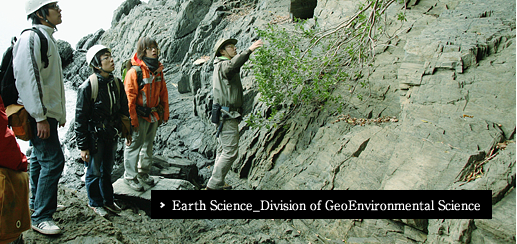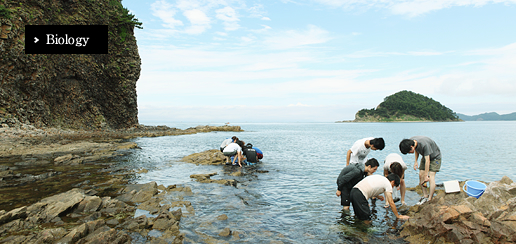Research
Mathematics

Mathematics is known to provide the language for describing the natural world. Its progress has been directly linked to that of other scientific fields, as notably seen in the case of Einstein's formulation of general relativity, made possible by the timely development of Riemannian geometry.
The Mathematical Institute of Tohoku University was established in 1911. Many important contributions to various fields of modern mathematics have since originated at the Institute. Among these are Tannaka's Duality Theorem, by Tadao Tannaka, as well as the concept of Sasakian Manifolds, by Shigeo Sasaki, which has recently drawn renewed interest in its connection to Superstring Theory. The Institute is currently a base of many researchers and students, both undergraduate and graduate, who are actively engaged in a wide range of research fields, which cover algebra, analysis, geometry, and logic.
The Institute houses a library, one of the best in the country, which holds more than 60,000 books and journals. The members of the Institute have full access to the resources, and it offers a welcome environment for active learning and research. In addition, the Institute has continued to publish the "Tohoku Journal of Mathematics" since its founding in 1911, the very first of its kind in Japan, now internationally recognized for its academic authority.
Physics

The Department of Physics at Tohoku University is one of the oldest and largest in Japan, having almost a 100-year history since its foundation in 1911 and it now has a faculty of more than 160 professors and about 250 students in the graduate school. Not only the faculty members but also those from research institutes and laboratories are actively involved in the school's programs. Research in our department covers all physics fields from particle and nuclear physics to condensed-matter physics, and extends even further to biophysics and industrial physics. Our graduate students are undertaking world-class research at the highest levels at the frontiers of physics under the guidance of their experienced supervisors. The advanced research facilities of our Department assist in their activities. Our Department ranks second in Japan and eleventh in the world in physics in 2012 according to a report by ISI Web of Science.
Astronomy

We are conducting theoretical and observational researches of extra-solar planets, stars, galaxies, clusters of galaxies, and cosmology. Observational researches are conducted using cutting-edge open use facilities such as Subaru telescope. We are also developping unique instruments for large telescopes, to reveal formation and evolution of galaxies. Background image is a ultra-deep field image taken with the Subaru/MOIRCS and the HST/ACS. Subaru/MOIRCS is developped in the institute in collaboration with National Astronomical Observatory of Japan. Top-right is the center of the Orion nebula taken with Subaru/MOIRCS. Top-left image is students around the 50cm telescope at the top of our building.
Geophysics

Geophysics is a broad research field that studies solid Earth, oceans, atmosphere, upper-atmosphere, ionosphere and planets. Geophysicists take physical approaches to investigate various phenomena in these areas and study their structures as well as their long-term and short-term variations in order to clarify the formation and evolution processes of our mother Earth and the solar system. In recent years, as a natural science geophysics has been developing with a close relationship to our human society. During the last 60 years, Department of Geophysics has made great efforts and important contributions to establishing the framework of geophysics. We treasure the glorious history and tradition made by many of our seniors in the Department, and at the same time we are working to open new frontiers of geophysics.
Chemistry

The department of chemistry was established in June 1907 with the establishment of Tohoku Imperial University, predecessor to the present Tohoku University. In the 100 years since its founding, the department of chemistry has grown to the most prestigious institution in chemistry of Japan. The department of chemistry, with its 52 faculty members of 17research groups, is now the largest in the nation. The number ratio between students and faculty members is almost 1:1, and it creates a highly conducive environment for student research and study. The members of the department of chemistry are all instilled with a strong motivation to seek out and investigate the unknown, and many of our most outstanding scientists have left a legacy of important work in their respective fields. Majima Riko, Akabori Shiro, Nozoe Tetsuo, and Koji Nakanishi, all recipients of the National Culture Award of Japan, are four of the most distinguished members of our faculty.
Earth Science Division of GeoEnvironmental Science

The Earth's integrated system of atmosphere, hydrosphere, and biosphere is driven by the energy of solar radiation just as we are, and even the system of the solid Earth (lithosphere) is driven by the decay energy of radioactive elements in the Earth. The boundary region between these four spheres is called the Geosphere, and these four spheres interact through the circulation of energy and materials. A huge variety of episodes has occurred and evolved in the Geosphere during the long history of the Earth, and we human beings are the newest product of this sphere. Our Department of Geoenvironmental Science is pursuing changes in the past, present, and future of the Geosphere's environment from ancient rocks and sediments through current knowledge of physics, chemistry and biology, which are not yet fully understood only by using today's observational research, from the viewpoint that they are snapshots of the evolving Geosphere. Our Department is coming to a better understanding of the Earth's environmental system because current human activities are having serious consequences on the Earth's environment.
Earth Science Division of Earth and Planetary Materials Science

Research on highly advanced Earth and Planetary Science is required to address new topics and find new tools to not only understand the phenomena of Earth but also those of space environments. These include studies on the ultra-high pressure of planetary minerals, the evolution of materials and life on Earth and in space environments, the formation of low-gravity materials in space, and various molecular-scale materials-formation mechanisms. The Department of Earth Science has not hesitated to adopt novel methods and to develop advanced techniques for synchrotrons, microgravity, and novel in-situ observation systems for crystal growth and phase transition.
Biology

The land that we stand on, the air that we breath, the food that we eat, all are products of the past 4.6 billion years Earth history. We human beings too. How were we created? Where we will go? The Department of Biology was established in 1922 and has been producing a number of graduates and postgraduates active in both academic and non-academic world. Since the Department was founded, the priority-in-research and open-door spirits of Tohoku University prevail over the Department as well. While the Department has kept the spirit and tradition founded by the pioneers on the one hand, it is promoting updated research activities in response to ever-developing biological sciences on the other. Present research activities cover the wide range of basic biology, from molecular and cellular biology through ecology and evolutionary biology. Three facilities, the Asamushi Laboratory of Marine Biology, the Mount Hakkoda Botanical Laboratory, and the Botanical Garden, also contribute to the education and research activities in the Department. In 2001, the whole department was reorganized to establish the Graduate School of Life Sciences. We more than welcome talented biologists and students to promote and enjoy biological sciences in Sendai.




